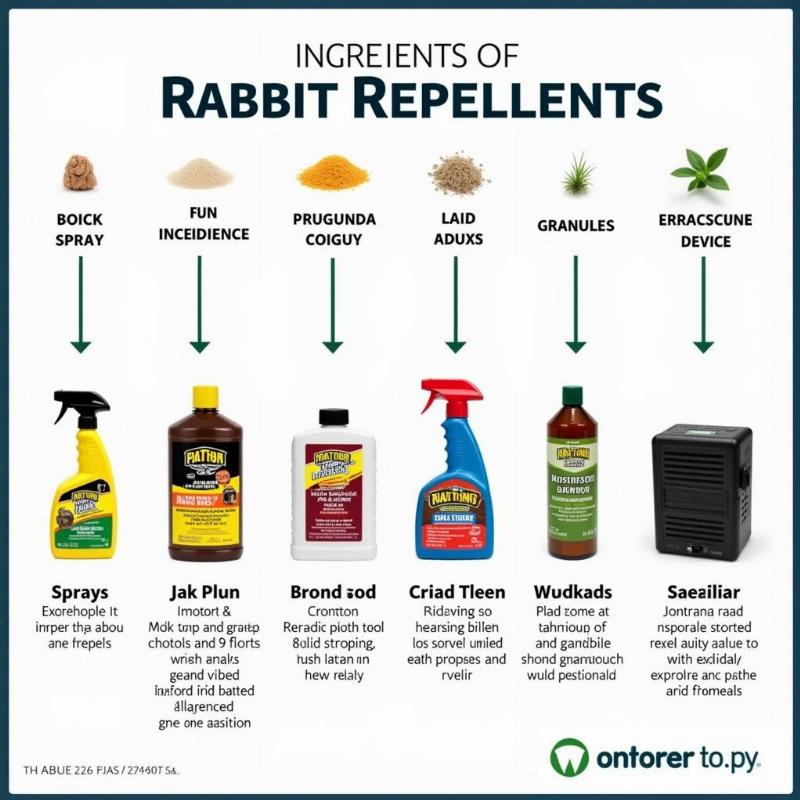Rabbit repellents marketed for dogs and cats are a hot topic for pet owners battling unwanted critters in their gardens. Balancing the need to protect plants with the safety of beloved pets is paramount. Understanding the types of repellents, their effectiveness, and potential risks is crucial for responsible pet ownership. This article dives into the world of “go away rabbit” dog and cat repellents, offering insights to help you make informed decisions for your furry friends and your flourishing garden.
Understanding “Go Away Rabbit” Repellents
“Go away rabbit” repellents come in various forms, including sprays, granules, and electronic devices. Some utilize strong scents like garlic, pepper, or putrescent egg solids to deter rabbits, while others rely on taste aversion or motion-activated sprinklers. Knowing the specific ingredients and mechanisms of action is key to ensuring your chosen repellent is both effective and safe for your pets.
 Types of Go Away Rabbit Repellents
Types of Go Away Rabbit Repellents
Safety Considerations for Dogs and Cats
While many repellents claim to be pet-safe, it’s essential to exercise caution and do your research. Some ingredients, while natural, can cause mild irritation to a pet’s skin, eyes, or respiratory system. Ingesting certain repellents can lead to more severe gastrointestinal issues. Always check the product label for specific warnings and precautions related to pets.
Choosing the Right Repellent for Your Needs
Selecting the right repellent involves considering your garden’s size, the severity of the rabbit problem, and the specific needs of your pets. For example, if you have a dog that frequently grazes on grass, you’ll want to avoid granular repellents that could be easily ingested. Similarly, if your cat enjoys exploring the garden, a motion-activated sprinkler might be a safer and more effective option than scent-based repellents.
Creating a Rabbit-Resistant Garden
Beyond repellents, implementing other strategies can further deter rabbits and create a more harmonious environment for your pets. These include fencing off vulnerable plants, using raised garden beds, and removing potential rabbit hiding spots. Providing alternative food sources for rabbits, such as planting a designated “rabbit garden” with their favorite greens, can also help redirect their attention away from your prized plants.
Alternatives to Chemical Repellents
For pet owners seeking natural alternatives, several options exist. Planting rabbit-resistant flowers and shrubs can naturally discourage them. Sprinkling dried blood meal or bone meal around plants can also act as a deterrent, though the smell can be unpleasant for some pet owners.
Are Homemade Repellents Safe for Pets?
While the internet is full of homemade repellent recipes, using them can be risky for pets. Many DIY concoctions involve ingredients like hot peppers or essential oils that can be toxic to animals. Sticking to commercially available, pet-safe repellents is generally recommended.
When to Consult a Veterinarian
If your pet exhibits any unusual symptoms after exposure to a rabbit repellent, such as vomiting, diarrhea, or excessive drooling, contact your veterinarian immediately. Prompt veterinary care can help prevent serious complications.
Conclusion
Keeping rabbits out of your garden while ensuring your pets’ safety requires careful consideration and informed choices. By understanding the various types of “go away rabbit” dog and cat repellents, their potential risks, and available alternatives, you can create a thriving garden that’s a safe haven for both your plants and your beloved furry companions. Remember to always prioritize your pet’s well-being and consult with your veterinarian if you have any concerns.
FAQ
-
Are all “go away rabbit” repellents safe for pets? No, not all repellents are safe. Always check the product label for specific warnings and precautions.
-
What should I do if my pet ingests a rabbit repellent? Contact your veterinarian immediately.
-
Are there natural alternatives to chemical repellents? Yes, options like rabbit-resistant plants, blood meal, and bone meal can be effective.
-
How can I create a rabbit-resistant garden? Fencing, raised beds, and removing hiding spots can deter rabbits.
-
What are the different types of rabbit repellents? Sprays, granules, and electronic devices are common types.
-
What ingredients should I avoid in rabbit repellents if I have pets? Certain essential oils and hot peppers can be toxic to animals.
-
Can homemade repellents be safe for pets? Homemade repellents can be risky; using commercially available, pet-safe products is recommended.
Beautdogs.us is your premier online destination for comprehensive dog care information, breed insights, and a curated selection of products tailored to the needs of dog owners across the US. Whether you’re a seasoned dog parent or just starting your journey, Beautdogs.us offers expert advice and resources to help you nurture the well-being of your beloved canine companion. From breed-specific guides to grooming tips and product recommendations, we’re your trusted source for all things dog-related. Contact us today for personalized guidance! Email: [email protected], Phone: +1 501-555-7529. Visit Beautdogs.us to explore our extensive resources and discover how we can help you provide the best possible care for your furry friend.